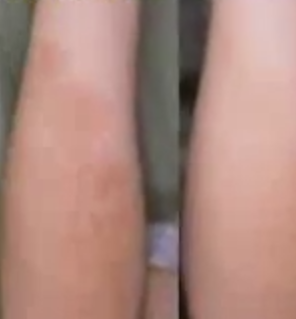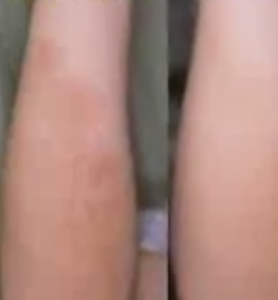Medically called pruritus, itching can be localized or generalized. The latter is typically a sign of some underlying systemic disorder, while localized itching, like itchy hands and feet, is often an indicator of some skin disease.
Causes of itchy hands and feet
Some of the common causes and associated symptoms of itchy hands and feet are listed below:
- Dermatitis: Irritant contact dermatitis is caused due to direct contact of the skin with items that cause inflammation. Itchy hands and feet and itching rashes may sometime occur due to direct skin contact with chemicals present in shower gels, soaps, detergents, fabric softeners, or solvents.
- Allergic contact dermatitis can be defined as a hypersensitive reaction caused due to contact with substances that are recognized as allergens by the immune system. Some of the common allergens include poison ivy, nickel, rubber, and/or preservatives present in some cosmetics. It may or may not cause skin rashes.
- Psoriasis: It is a skin disorder marked by inflamed skin patches, itchiness, and development of silvery scales. Palmoplantar psoriasis is a type of psoriasis that features scaling and thickening of the soles and palms, red sore patches, and itchy hands and feet. Doctors think that psoriasis is caused due to an abnormal immune system response that hastens skin cells growth. People may suffer from an episode due to triggers like skin injury, infections, dry skin, stress, and use of some medicines.
- Dry skin: Medically termed as xerosis cutis, dry skin is one of the most common causes of itchy hands and feet. It may or may not occur with a skin rash. Skin tends to become dry due to varied reasons like loss of natural oils of the skin by increased sun exposure; reduced humidity and moisture, particularly in cold weather; an increasing age marked by loss of natural oils; and spending prolonged periods in air-condition enclosed environments.
- It may be noted that natural oils play an important role in regulating the quantity of water that is lost through the epidermis. Thus, loss of natural oils leads to loss of water from the skin, thereby making it flaky and dry. Dry skin is prone to inflammation, which is what results in itchiness.
- Dyshidrotic eczema: Also known as vesicular eczema of the feet or hands, dyshidrotic eczema is a type of inflammatory skin condition that causes itching blisters, inflammation of the epidermis, and cracked skin. The blisters are what cause itchy hands and feet. Doctors are unaware of the exact cause, but it is thought a personal history of asthma, contact dermatitis, or allergies can increase the risk. The condition can deteriorate when the hands are wet frequently.
- Pitted keratolysis: It is a non-inflammatory skin condition that primarily affects the palms and soles of feet. Caused by a bacterial infection, pitted keratolysis is marked by the development of pits or tiny depressions on the skin’s outer layer. Wearing tight closed shoes or boots as well as elevated perspiration can increase the risk to developing the disorder.
- Other causes: Itchy hands and feet may also occur due to:
- Scabies, a parasitic infection caused by mites that burrow into the skin and cause reddish rash. The infection typically occurs between the fingers and the toes. It is treated with topical medicated creams.
- Ringworm, a fungal infection that causes red, itchy, scaly, circular patches on the skin. It is treated with topical antifungals. Sometimes, doctors may prescribe oral anti-fungal drugs.
- Kidney dysfunction, liver diseases, and chronic kidney failure initially causes itchy hands and feet before the itchiness becomes generalized. In this case, there may or may not be a rash.
- A diet that does not have essential vitamins such as B12, B6, and B1.
- Hyperthyroidism and hypothyroidism, i.e., an overactive or underactive thyroid gland can cause the skin to become dry, thereby causing redness and itchiness of the hands and feet. Skin rash may or may not develop.
- Underlying conditions like Crohn’s disease, leukemia, sun poisoning, stress, celiac disease, Lymphoma, gallbladder diseases, and rheumatoid arthritis.
Treatment of itchy hands and feet
Treatment of itchy hands and feet is dependent on the cause. Some treatment options are as follows:
- Best treatment option for dermatitis is to avoid the irritants and allergens that make the skin itchy and red. Also avoid products that cause allergic reactions.
- Psoriasis has no cure. The symptoms may be alleviated with immunomodulator medications, topical corticosteroids, immunosuppressant drugs, and/or light therapy.
- Keeping the skin moisturized is the best way to treat and prevent dry skin. People with sensitive skin should use skin care products that are suited to their skin type. Emollients can help maintain the suppleness and softness of the skin.
- For dyshidrotic eczema, itchy hands and feet may be treated with anti-itch creams. The skin needs to be kept moisturized. Doctors may prescribe steroids to treat severe cases. Do not scratch the affected skin as doing so can cause wounds which are then susceptible to secondary infections.
- Treatment of pitted keratolysis involves topical antibiotics and wearing proper, airy, comfortable footwear.

